What is a Restaurant POS System and Why It’s Crucial for UAE Businesses

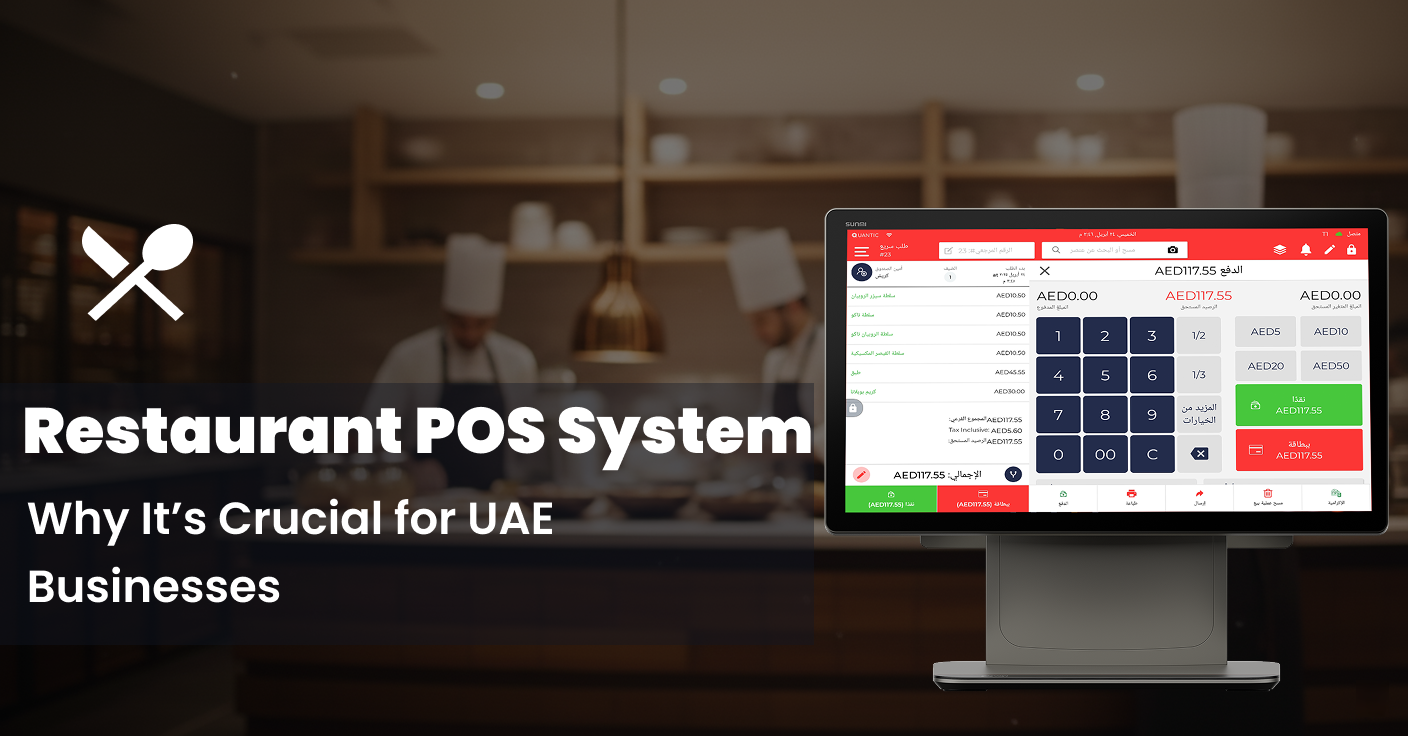
In today’s fast-paced hospitality industry, having the right tools can be the difference between a thriving restaurant and one that struggles to keep up.
Technology adoption is now a necessity rather than a luxury in the United Arab Emirates (UAE), where the culinary scene is both diverse and highly competitive.
The UAE food services market was valued at USD 8.54 billion in 2023 and is expected to reach USD 13.37 billion by 2032, growing at a CAGR of 5.1%.
A restaurant POS system is one of the most important tools that restaurant owners are currently investing in, but what exactly is a restaurant POS system, and why is it important for restaurants in the UAE?
This blog post will explore what a point-of-sale (POS) system is, its key advantages, how it helps the UAE’s restaurant industry address its unique challenges, and how platforms like Quantic POS can elevate restaurant operations to the next level.
What is a Restaurant POS System?
A restaurant POS (point-of-sale) system is a combination of hardware and software that streamlines various processes and facilitates transactions.
In the past, POS systems were only used for payment processing and billing.
Nonetheless, modern point-of-sale platforms, particularly those designed for the restaurant sector, have developed into reliable management systems.
In addition to printing receipts, they also manage orders, track inventory, improve employee performance, create reports, integrate loyalty programs, sync with delivery platforms, and provide analytics-driven business insights.
Core Components of a Restaurant POS System
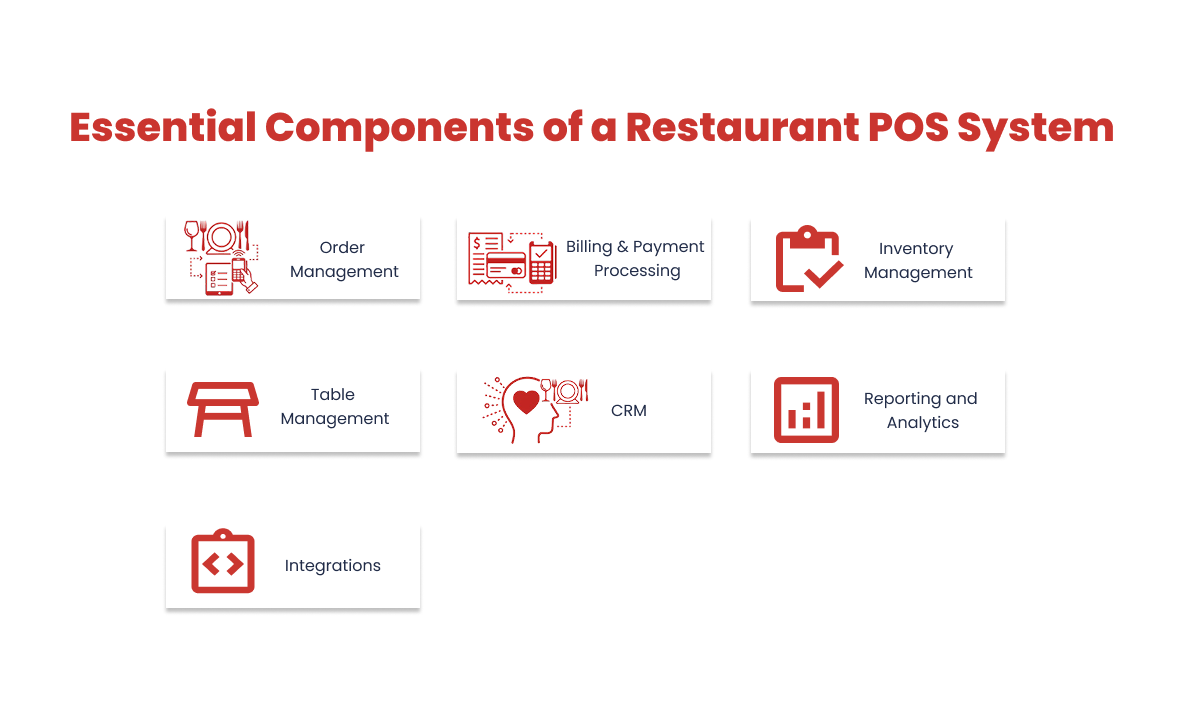
1. Order Management
This central component of the POS system manages the entire ordering process.
Key Functions:
- Facilitates delivery, takeout, and dining processes.
- Enables order customizations (such as “extra spicy” or “no onions”).
- Allows for real-time order modifications and split billing.
- Allows orders to be sent straight to the kitchen by syncing with printers or kitchen display systems (KDS).
- Allows employees to use terminals or handheld devices to manage multiple orders at once.
2. Billing and Payment Processing
Ensures quick, safe, and flexible transaction processing.
Key Functions:
- Accepts various payment options, including gift cards, cash, credit/debit cards, QR codes, NFC (contactless), and mobile wallets like Apple Pay and Google Pay.
- Allows guests to split bills and make partial payments.
- Applies taxes, service fees, or discounts automatically.
- Provides payment gateway integration for smooth online transactions.
- Creates invoices and electronic receipts via SMS or email.
3. Inventory Management
Optimizes purchases and minimizes waste by continuously monitoring ingredient and stock levels.
Key Functions:
- Automatically adjusts inventory levels with each sale or stock receipt via barcode scanning.
- Inventory tracking can be turned on/off per item, along with price and cost-of-goods updates.
- Generates purchase orders directly from the system and tracks their receiving status.
- Enables easy stock adjustments and re‑receiving using barcode scanning or the Quantic Lite device.
4. Table Management
Enables efficient handling of seating and service operations within the restaurant.
Key Functions:
- A visual floor plan makes it simple to assign guests and keep track of tables.
- Real-time table status updates (such as billing, occupied, reserved, and vacant).
- Enables waitlist management and reservations.
- Increases table turnover and decreases wait times by optimizing seating.
- Allows for table-specific ordering and billing by integrating with order management.
5. Customer Relationship Management (CRM)
Builds strong customer relationships by leveraging stored data.
Key Functions:
- Captures customer details – name, contact info, order history, and preferences.
- Enables targeted marketing (email/SMS campaigns, birthday offers).
- Manages loyalty programs (points, rewards).
- Tracks customer feedback and satisfaction.
- Supports online ordering profiles for personalized service.
6. Reporting and Analytics
Identifies areas for improvement and offers practical insights to support business decisions.
Key Functions:
- Real-time dashboards display daily sales, peak hours, best-selling products, etc.
- Creates reports that can be customized for sales, inventory, employee performance, and table turnover.
- Detects patterns and seasonality in customer behavior.
- Helps with key performance indicators (KPIs) like average order value, profit margins, and labor costs.
- Permits strategic planning and forecasting based on data.
7. Integrations
Ensures the POS system works seamlessly with other essential tools and platforms.
Key Functions:
- Integrates with third-party food delivery platforms (e.g., Uber Eats, DoorDash).
- Enables automated bookkeeping by connecting to accounting software (QuickBooks Online).
- Helps to expedite food preparation by supporting kitchen display systems (KDS).
- Integrates with QR code menus and online ordering systems.
- Gives access to APIs for future scalability and custom integrations.
Why Is a Restaurant POS System Crucial for UAE Restaurants?
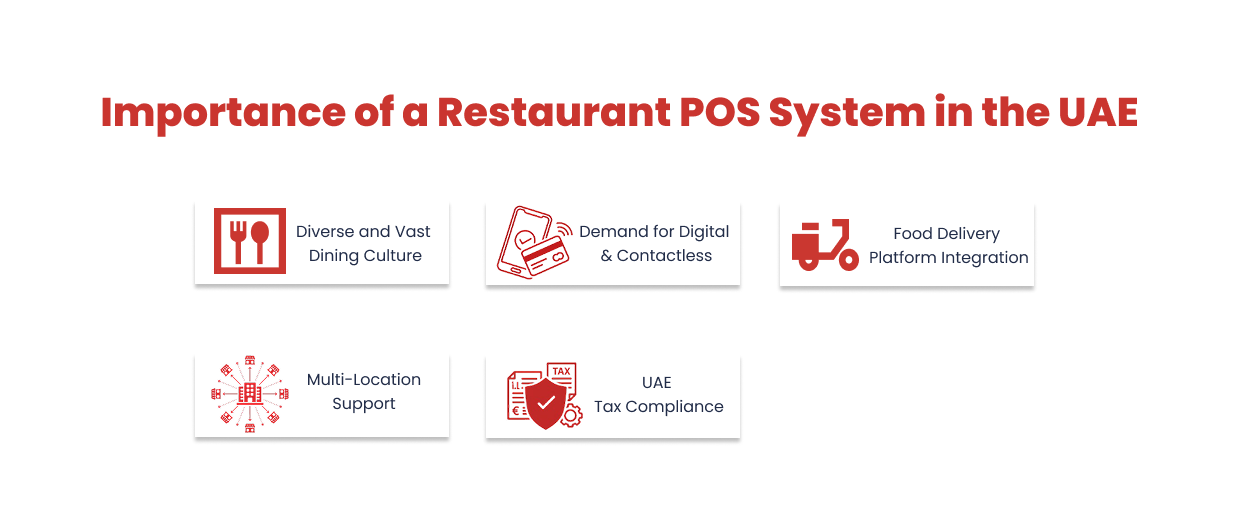
It’s more crucial than ever to stand out and run your business effectively in the thousands of restaurants that are open in Dubai, Abu Dhabi, Sharjah, and other emirates.
Here are some reasons why setting up a restaurant pos system in the United Arab Emirates is not only beneficial but essential.
1. UAE’s Diverse and High-Volume Dining Culture
The dining scene in the United Arab Emirates is multicultural and has high standards for both speed and quality of service.
Restaurants must provide a diverse range of cuisines, dietary requirements, and service expectations in the presence of residents and visitors from around the globe.
Large order volumes across service types – dine-in, takeout, delivery, and curbside can be managed with the help of a modern POS system.
Dubai alone is home to over 13,000 restaurants and cafés. No matter how busy your restaurant is, this flexibility ensures consistent performance.
2. Demand for Digital and Contactless Experiences
The pandemic accelerated digital transformation, which continues to progress strongly.
According to Mastercard, 82% of UAE consumers prefer contactless payments, with 73% switching to contactless-enabled cards during the pandemic.
Customers in the United Arab Emirates are becoming more accustomed to contactless payment methods, self-ordering kiosks, QR code menus, and mobile loyalty programs.
All of these features are made possible by a restaurant POS system, which raises customer satisfaction and safety.
3. Integration with Food Delivery Platforms
With popular apps like Deliveroo and Zomato, online food delivery is flourishing in the United Arab Emirates.
The UAE online food delivery market is expected to reach USD 2.6 billion by 2025.
Orders can enter the restaurant’s system automatically when a good point-of-sale system integrates with these platforms.
In a market where accuracy and speed are critical, this saves time and lowers errors.
4. Multi-Location and Franchise Support
Numerous franchises and restaurant chains are found in the United Arab Emirates.
Without a centralized system, managing several outlets can be difficult.
Restaurant groups can manage all their locations from a single platform with a point-of-sale (POS) like Quantic POS, which provides them insight into staff, sales, and inventory.
5. Compliance with UAE Tax Regulations
Restaurants must issue VAT-compliant invoices and keep accurate records since the UAE has implemented VAT.
By ensuring complete adherence to regional tax regulations, a restaurant POS system helps prevent expensive fines.
Key Benefits of Using a Restaurant POS System in the UAE
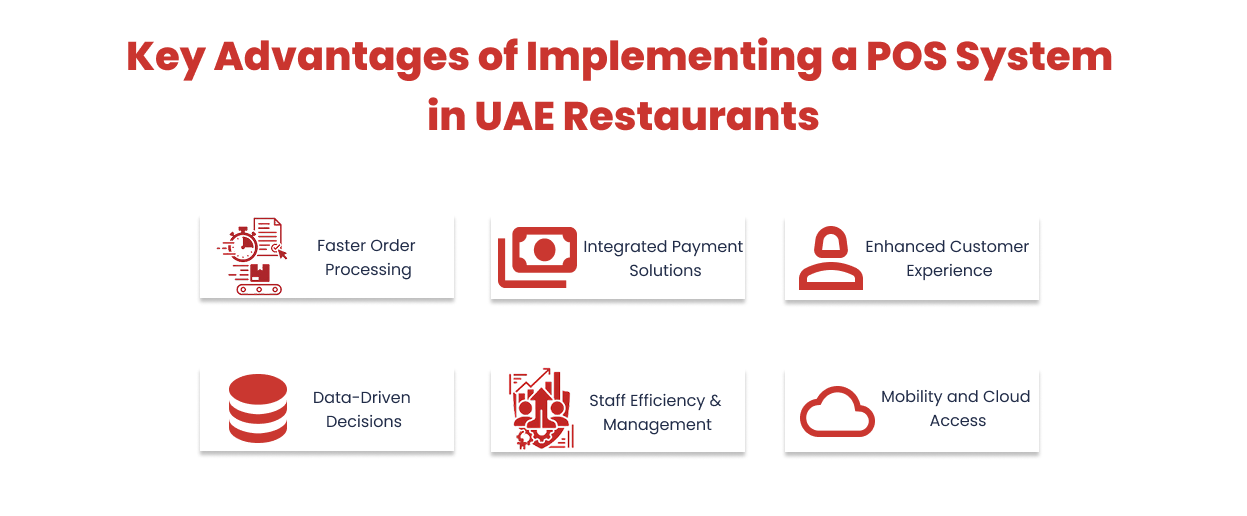
1. Faster and Error-Free Order Processing
Speed and accuracy are essential in the UAE’s competitive and busy dining scene, particularly in popular cities like Dubai and Abu Dhabi.
POS System Advantages:
- Eliminates handwritten errors by digitizing the entire order-taking process.
- Reduces wait time by sending orders to the kitchen instantly.
- Permits special requests and order changes in real time.
- Reduces order errors, which raises customer satisfaction.
2. Integrated Payment Solutions
Secure and easy payment processes are crucial for productivity and client satisfaction in the UAE’s fast-paced hospitality sector.
POS System Advantages:
- Allows for seamless integration with major payment gateways and banks located in the United Arab Emirates.
- Supports mobile wallets such as Apple Pay, Google Pay, and Samsung Pay, as well as contactless (NFC) and EMV (chip).
- Provides flexible payment options by accepting partial payments, store credit, and gift cards.
- Improves general customer satisfaction and trust by lowering payment-related errors.
3. Enhanced Customer Experience
Diners in the UAE demand personalized interaction, excellent service, and digital convenience.
POS System Advantages:
- Integrates with CRM to store customer preferences, birthdays, and order history.
- Supports loyalty programs and personalized discount campaigns.
- Speeds up service with digital menus and contactless payment options.
- Offers bilingual interfaces (Arabic/English) to accommodate a diverse clientele.
4. Data-Driven Decisions
Since data is the new currency, restaurant owners who want to succeed in a market as dynamic as the UAE must have clear insights.
POS System Advantages:
- Provides real-time dashboards that are cloud-based and accessible from any location.
- Helps in determining the best-performing employees, dishes, and sales times.
- Helps with cost analysis and menu engineering.
- Helps with staffing or promotion planning during busy times (e.g., Eid holidays, Expo events).
5. Staff Efficiency and Management
Having a knowledgeable, well-run staff is essential to providing outstanding service.
POS System Advantages:
- Keeps track of role-based permissions and attendance.
- Tracks employee productivity and sales performance indicators.
- Saves time on tip tracking and manual reporting.
- Prevents unwanted system access and assures accountability.
6. Mobility and Cloud Access
In an area where food trucks, pop-up events, and outdoor dining are popular, flexibility is essential.
POS System Advantages:
- Enables wireless operations with terminals based on iPads or Android tablets.
- Allows for remote operation monitoring through cloud-based access.
- Allows for mobile ordering and payments, making it perfect for festivals or beach cafes.
- Enables business continuity even in the event of network or power outages.
Challenges Faced by UAE Restaurants Without a POS System
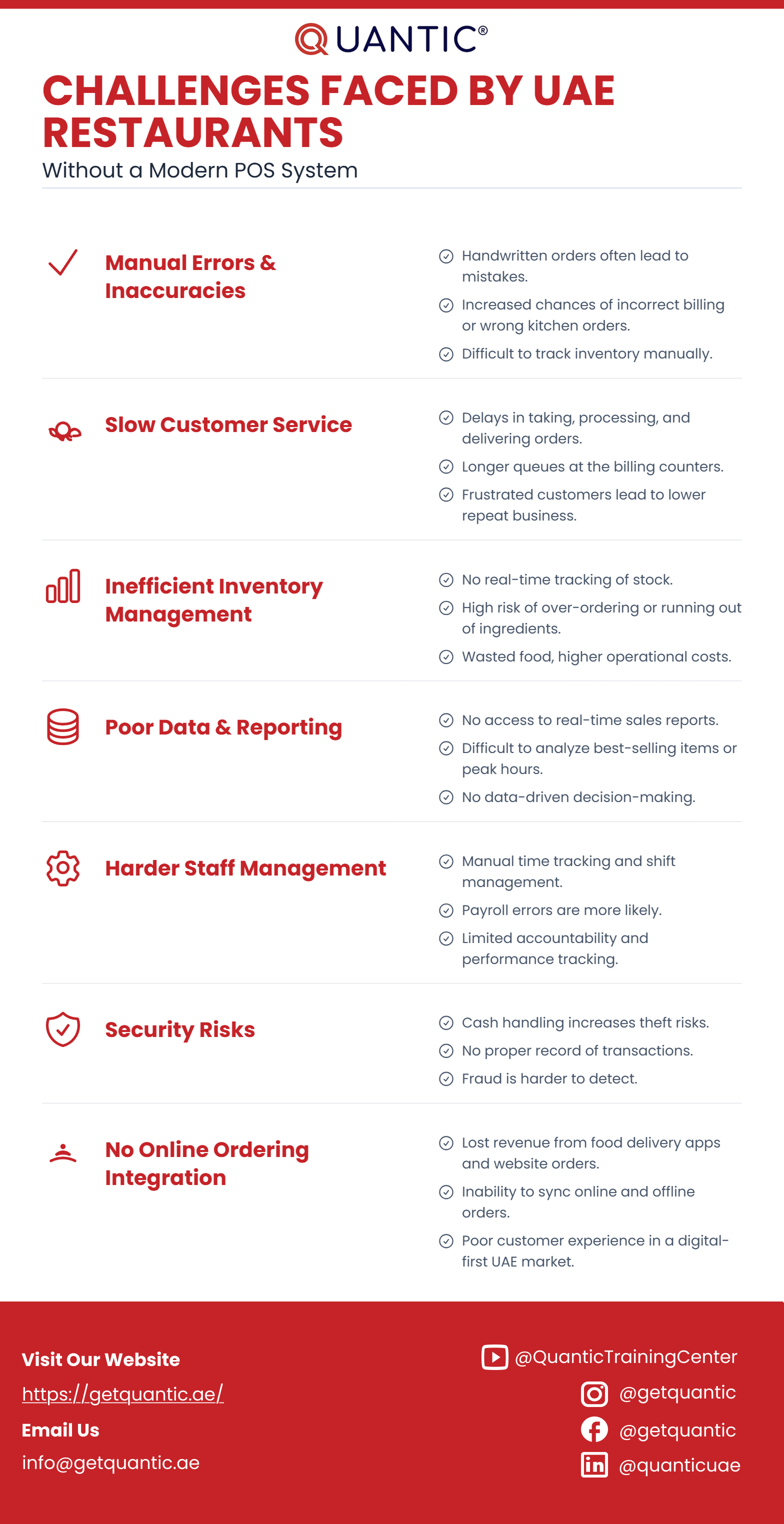
How Quantic POS Stands Out in the UAE Market
Although there are many POS providers, Quantic POS provides a customized solution made especially to meet the specific challenges faced by the restaurant industry in the United Arab Emirates.
Multilingual Support
English and Arabic are among the languages that Quantic POS supports, which is essential in a workforce that is diverse like the UAE.
Customization for Every Business Model
Quantic POS can be tailored to suit any type of restaurant, from quick-service shawarma stands in Sharjah to fine dining establishments in Dubai Marina.
Seamless Integration with UAE-Based Platforms
It ensures local compatibility and support by seamlessly integrating with accounting systems, delivery platforms, and payment gateways based in the United Arab Emirates.
24/7 Local Support
With teams that understand the specific requirements of restaurant owners in the United Arab Emirates, Quantic provides 24/7 support.
Professional support is only a phone call away, whether you’re expanding your business or opening a new location.
Final Thoughts
Adopting a restaurant point-of-sale system is not just about staying up to date, but also about establishing the standard in a competitive and quickly expanding foodservice sector like the UAE’s.
Quantic POS offers the adaptability, features, and local support you require to succeed, whether you’re an independent proprietor starting a gourmet food truck in Abu Dhabi or overseeing a franchise with five locations in Dubai.
Take the next step to manage your restaurant more profitably, quickly, and intelligently.
Invest in your company’s future by using Quantic POS, the most popular restaurant pos system in the United Arab Emirates.
